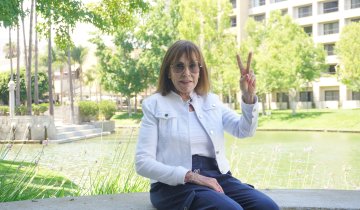A bequest from the Pullias Family estate has established the newly named Earl and Pauline Pullias Center for Higher Education at the USC Rossier School of Education. The center previously was known as the Center for Higher Education Policy Analysis.
The gift allows one of the world’s leading research centers on higher education to continue its tradition of focusing on research, policy and practice to improve the field.
Earl Pullias was one of the founding faculty members of USC’s Department of Higher Education in 1957. He was the author of more than 100 research articles that primarily focused on philosophical issues in higher education. He also was author and co-author of numerous books. The center’s annual Pullias Lecture series brings nationally recognized scholars to USC to contribute to academic dialogue on topics in higher and postsecondary education.
Established in 1994, the interdisciplinary center has been renowned for research that informs postsecondary education governance and policy, as well as outreach programs that improve college access and success for underrepresented youth.
University Professor William G. Tierney, the Wilbur-Kieffer Professor of Higher Education at USC Rossier, is director of the Pullias Center.
A sought-after lecturer and expert in the areas of educational equity and postsecondary effectiveness, Tierney recently was elected to serve as 2012–13 president of the American Educational Research Association (AERA). He is the first USC scholar to preside over AERA, the oldest and largest education research association in the world.
Associate director Adrianna Kezar conducts research on the strategies needed to create better access and completion of college students aligned with the work of the Pullias Center. Kezar’s research also complements Pullias’ interest in improving teaching.
The center has undertaken policy-oriented research on issues related to the new arena of for-profit colleges and universities and their role in meeting demands for a more educated workforce. Affiliated faculty members study issues of non-tenure and adjunct faculty, financial aid access for students of color, diversity, homeless youth and educational trajectories of community college students.
“We are very grateful to the Pullias family for making this gift possible,” said USC Rossier Dean Karen Symms Gallagher. “The Pullias Center can now expand its research on postsecondary institutions, as well as its critical community outreach work helping underserved students get into college.”
For 18 years, the center has conducted important work in the field of college access for underrepresented youth. Two outreach programs have helped hundreds of low-income, first-generation students in the Los Angeles area navigate the financial aid and college application processes.
USC Rossier’s SummerTIME program provides local underserved college-bound students with intensive college-level writing preparation, grammar and language-skill instruction, as well as college knowledge and resources during the summer before they begin college. Increasing Access Via Mentoring (I AM), a local mentoring project, matches high school seniors with USC faculty, staff and students for individual guidance as they apply for financial aid and college admittance.
The center recently partnered with the Game Innovation Lab at the USC School of Cinematic Arts and the USC Rossier Center for Outcomes Research and Evaluation in the development of Collegeology Games, which help students master the necessary knowledge to reach college. The card game Application Crunch helps high school students understand the financial aid and college application process. It is available at the USC Bookstore and through Amazon.com. A Facebook application of the game is due to launch in March.
This year’s Pullias Lecture on March 29 will be delivered by Clayton M. Christensen, the Kim B. Clark Professor of Business Administration at the Harvard Business School, who is best known for his study of innovation in commercial enterprises.
Christensen, author of The Innovative University: Changing the DNA of Higher Education From the Inside Out, will speak from 4 to 6 p.m. in the Embassy Room at the Davidson Continuing Education Center. For more information, contact Diane Flores at dianeflo@usc.edu.



